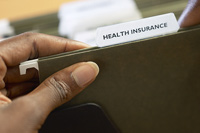Plan Ahead for Illness or Injuries During Your Trip
Plan ahead for illnesses, injuries, or other medical issues
Travel Health and Medical Evacuation Insurance

- Travelers are responsible for hospital and other medical expenses incurred during their trip. Visit Country Specific Information - Medical Insurance (U.S. Department of State) to learn more.
- Check your health insurance plan to see if they will cover your health needs abroad.
- Think about purchasing additional health insurance for your trip if your health insurance does not cover you while you are traveling.
- Consider purchasing medical evacuation insurance. This kind of insurance will cover the cost of transporting you to other parts of a country or outside the country if you are seriously ill or injured.
- To find a list of possible travel health and medical evacuation insurance companies, visit Medical Information for Americans Abroad (U.S. Department of State).
- For more information, visit the section Health: What You Need to Know in Advance of Travel
- Be prepared to pay out of pocket at the time you receive any medical services while traveling, even if you do have insurance.
Be Prepared for Illness Before and During Travel
It is a good idea to know beforehand the signs and symptoms of illness. This will prepare you to recognize these symptoms so that you can take action quickly while on your trip. CDC defines an ill traveler as a person who has one or more of the following symptoms:
- Appearing obviously sick (e.g., severe headache, weakness, skin or eyes turning yellow)
- Fever of 100° F (38° C) or greater
- Skin rash
- Shortness of breath or difficulty breathing
- Severe cough that does not go away
- Confusion, especially if it has just started
- Bruising or bleeding (without previous injury)
- Diarrhea that does not go away
- Vomiting that does not go away (other than motion sickness)
If you have any of these symptoms while you are still at home, you should talk with your doctor before traveling.
Blood Clots (Deep Vein Thrombosis)
Airplane travel, especially flights longer than 8 hours, may increase the risk for blood clots, also known as Deep Vein Thrombosis/Pulmonary Embolism (DVT/PE). To read more about DVT/PE, see the information at Deep Vein Thrombosis/Pulmonary Embolism.
You are at increased risk for DVT/PE if you:
- Have had DVT/PE in the past,
- Have had recent surgery (especially abdominal or orthopedic surgery),
- Are pregnant,
- Are a smoker,
- Are taking birth control pills or hormone replacement therapy, or
- Have cancer, restricted movement, or a blood-clotting problem.
If you have any of these conditions, talk to your doctor before traveling. People at higher risk for DVT/PE may be prescribed medication during travel.
To prevent DVT/PE during flight:
- Stay hydrated
- Wear loose-fitting clothing
- Make an effort to walk and stretch your legs and arms at least once an hour
- Your doctor may recommend that you wear special stockings that reduce leg swelling and encourage blood flow
Oxygen Levels in Flight
The air pressure in flight is lower than that at sea level. This lowers the amount of oxygen carried in the blood. Most healthy travelers will not notice these changes. However, passengers with certain medical conditions, particularly heart and lung diseases and blood disorders, such as anemia, may not be able to tolerate this reduced oxygen level. If you are concerned about needing more oxygen, talk with your doctor and the airline a few days before your trip to arrange for additional oxygen during flight.
Contact Us:
- Centers for Disease Control and Prevention
1600 Clifton Rd
Atlanta, GA 30333 - 800-CDC-INFO
(800-232-4636)
TTY: (888) 232-6348 - New Hours of Operation
8am-8pm ET/Monday-Friday
Closed Holidays - Contact CDC-INFO


